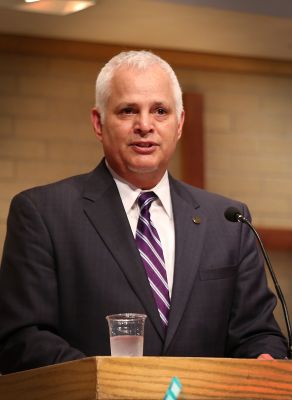President’s Speech: “Listening to the World: The First Commandment of a Global Citizen”

Spring semester convocation message, delivered by Dr. James E. Brenneman, President of Goshen College, on Wednesday, Feb. 4, 2015, in the Goshen College Church-Chapel (as prepared for delivery).
I.
The very first time I heard the popular song, “Take Me to Church,” I stopped short. In a heartbeat, I knew I was hearing a lyrical and musical tour de force. Never mind Katy Perry, Bruno Mars, Taylor Swift… I could only shut up and listen…
Take me to church
I’ll worship like a dog at the shrine of your lies
I’ll tell you my sins and you can sharpen your knife
Offer me that deathless death
Good God, let me give you my life.”
Yes. I know the words, all of them. I have listened and listened and listened to this song. I have seen the video, read and listened to interviews with the song’s author and performer, Andrew Hozier Byrne – an Irish singer in the mold of Bono. By his own admission, Hozier purposefully borrowed sacred words for his secular hymn to provoke the majority Christianized culture to think again about big doctrines like ‘original sin’ and sexual exclusion in the church.
At minimum, so close to the 70th anniversary of the liberation of Auschwitz, where the Nazi’s annihilated Jews, homosexuals, pacifists, Jehovah’s Witnesses, gypsies, the disabled and those who would dare to help any of them, Hozier’s song decries violence against people just for being who they are or for believing what they do.
But let’s dig a little deeper. In borrowing and mixing sacred and sexual imagery to tell a truth, Hozier is not that novel of a poet. In fact, the prophet Hosea in the Bible, eight centuries before Christ, mixed the sacred language of his day with the sexual imagery of Baal worship to speak of profound intimacy between God and God’s people Israel. It was provocative then. It is provocative now.
In a far deeper sense, to those with ears to hear, Hozier’s haunting voice and lyrics touch a primal God-given nerve. If we listen, carefully, we might even conclude that “Take me to the Church” most profoundly evokes the human desire to be loved intimately and to love in return (by God and others): to love and be loved with all one’s heart, all one’s body, all one’s soul, all one’s mind, and all one’s strength.
Let me cut to the chase. It is my sincere hope that after this short time together today, we will be reminded again that when we encounter a person different than ourselves, someone with a different accent, different food tastes, and different cultural norms – when we encounter truth-claims of a religion different than our own, perhaps, even a provocatively pagan idea, an irreverent song lyric, or a boundary-pushing artist – I hope our first impulse will not be to shutter, laugh, slam, criticize or roll our eyes. Rather, I hope we first, and above all, listen. Period.
Stop and listen!
The first imperative, then, the first requirement, the first commandment of being a global citizen, especially a Christ-centered global citizen, is simply this: Listen! I say this in part because of the first commandment in the Hebrew Bible, that is, the first positive rendering of the negative version of “Thou shall not have other gods before me,” is the “Shema.” (Deut.6:4). This text is, perhaps, the most important text in all of the Hebrew Bible. Recited on waking, the last thing before one goes to bed, bound to one’s forehead and arms, on one’s doorposts, and the last words recited before one dies. And the text begins with and is summarized in the singular word: (the) Shema! If it means anything at all, it first means, “Stop. And listen!”
For the church, any church or church institution, and especially a church-related liberal arts college, as valuable as our particular stories and narratives and belief systems are, we must always be aware that voices outside these systems or minority voices within our particular story-shaped confession of faith, also belong to God. God speaks in many ways, across time and space, across 2-3-4-5 interrelated “kingdoms” (to use a biblical metaphor) and across confessional communities. The question comes fast and furious: are we listening – especially, so, when what is being said questions what we believe to be true? How well are we at listening to alternative points of view? Truly-listening.
For example, what does it mean for a self-identified exilic people, when the biblical prophet Isaiah does the audaciously crazy thing, in a divine speech, calling Cyrus the Great their messiah (45:1)? Think a world-leader like the President of the United States, only more imperial, ruthless, and cunning, and not democratically elected – Cyrus, the Great, their “christ”? Talk about an ‘outside-the-box’ perspective on an ancient, sacred doctrine of who the messiah could or could not be. Even Jesus, much later, was a peace-loving Jew. Cyrus was neither peace loving, nor Jewish. And yet, both are identified in Scripture as messiah, Christ.
And then there’s the prophet Amos (9) who dared to suggest that other nations and people groups besides Israel were also led by God out of their own Exodus experiences. Too few Christians today would allow such an expansive interpretation of these metaphors-turned-dogmatic categories as valid in any normative way.
Truths from the outside
Listening to others very different than ourselves will sometimes mean we will hear truths that break through our sometimes narrowly defined narratives and stories and experiences. Listening to others’ accounts of faith or truth-claims may have the effect of cutting through the dogmas of time and history that have sometimes reduced God’s great truths to little slivers of your, mine, and our truth-possessions. Truth-be-told, Christianity expanded as it did from a primarily Jewish sectarian movement to an expansive faith spread far and wide, why? Because those first Jewish believers, believing against the grain, found truth ‘outside’ the bounds of their faith in what to their peers seemed heretical, blasphemous, unorthodox, and untrue: that in the man Jesus, God was revealed. How crazy was that?
Sometimes it may feel just that crazy for us to discover truths more deeply truthful from outside our faith traditions than from the inside. Can we, for example, find truth speaking through voices that are not politically correct to our ears? Do Republicans or revivalists, High-Church traditionalists or Pentecostals, veterans or Buddhists, Appalachians or atheists have truths for Mennonite ears to hear, or vice versa? Is it possible that the ethical practices, pillars of faith and mystical insights, and coherent narratives of belief of non-Christian people-groups offer truthful accounts for living a flourishing life? Can science, music, Greek mythology and, say, an artistic masterpiece bear the load of real, honest-to-God, capital-T truth claims about life as we know it, life as it can be, life ever after, flourishing life.
Profound perspective
The first time I visited Washington D.C., I did so on my way home for the summer after my first year here at Goshen College. While in D.C., I visited the National Gallery of Art and found myself standing in an immense gallery surrounded by four huge mid-19th century masterpieces of the American painter Thomas Cole. The series is entitled, The Voyage of Life: one painting for each stage of life; childhood, youth, adulthood and old age. I will never forget that moment. I was utterly speechless, breathless even. Standing in that room, I saw my whole life laid out before and in front of me in a visceral, deep, visual way that I knew to be utterly true at a depth of understanding that I had never yet experienced. I was so young back then. But, my youthful life was placed in profound perspective that was as illuminating to me as a prophetic utterance in Scripture.




I learned that day, though did not yet have the words to signify what I was feeling, that the artist’s brush falls under the reign of God. I also encountered that day ‘art criticism’ in its profoundest sense. Only much later, while reading C.S. Lewis’ book An Experiment in Criticism, did I truly understand what happened to me that day. Though the primary purpose of Lewis writing the book was literary in scope (read and re-read books!), his words about great art rang true.
“We sit down before the picture [or object of art] in order to have something done to us,” he wrote. “Not that we may do things with it. The first demand any work of any art makes upon us is surrender. Look. Listen. Receive. Get yourself out of the way. (There is no good asking first whether the work before you deserves such a surrender; for until you have surrendered you cannot possibly find out.)” (18-19). Art criticism to be truly meaningful never begins with critique, but surrender. If you leap into criticism too early about anything, you may have disobeyed the first commandment of the Shema! “Listen, first.” In the presence of great art, Lewis says, “Look. Listen. Receive.”
Someone shared with me just this morning, what C.S. Lewis is getting at:
“The biggest communication problem is that we do not listen to understand. We listen to reply.
If that is true of a great piece of art, how much more so is it true when we encounter the artist? Or the scientist? Or the Catholic? Or the Mennonite? Or the Democrat? Or the gay or lesbian person? The Jew, the Palestinian, African American, Indian, Asian, saint or sinner? If the first demand a great work of art makes on us is to ‘listen,’ if the first commandment from Scripture is the Shema!, then the first command of a global citizen is also simply that, “Listen!
II.
The Shema (Deut. 6:4) also provides context, content and meaning to our listening: “Hear Oh Israel.” “Listen Oh Israel.” “Listen, Church.” “Listen, Goshen.” – “The Lord our God, the Lord is One.”
That is to say, around and among and behind and under, above and below all our many stories, narratives, hues, languages and differences – there is an underlying Integrity to Reality (J. Sanders). Even though sometimes (most times?) it feels like ‘the center does not hold’ – even though sometimes our many wonderful differences get sliced and diced into ever-narrower differences within differences within differences, until one can hardly fathom coherence – still, at base, there remains a deeply unifying reality that holds all these differences together.
This Integrity to Reality does not obliterate these differences in some hegemonic oppressive silencing power play, as has so often been the case in the past. Instead, it allows us to relish in our differences, to listen with abandon to one another, to worry less about being the same, or having all our boundaries clearly marked. In biblical language, this Integrity to Reality is simply put, the One God. Period. “Shema, the Lord Our God, the Lord is One.
What such a biblical faith claim underscores is that even the Judeo-Christian faith (more accurately Judeo-Christian faiths!) is but a subset, albeit a profound subset, of God’s expansive domain, God’s rule over all creation. In this very real sense, God’s creation, as creation, is and must always be first and foremost a prophetic critique of all would-be more narrowly tuned faith traditions that would too closely rein in God’s ultimate reign. A Christ-centered global citizen will not only listen first, but will also seek to discover truth in every encounter within the secular and sacred universalizing reign of God.
III.
So that’s it folks. At Goshen College, we have expressed the core value, Global Citizenship, primarily in two ways. At the beginning of the year, I spoke of global citizens as becoming citizens of the earth and sky, emphasizing our commitment to sustainability and creation care.
Today, I have highlighted the more common way we speak of becoming global citizens around here as fostering “intercultural openness” between people of differing world-views, religious faiths, experiences and ethnicities.
I close with two short vignettes about three individuals worthy of the name global citizen. Each of them when it mattered most, literally laid down their lives for someone else whose faith, ethnic identity, cultural ethos and social class was distinctly different than their own.
Last Friday, I visited the U.S. National Holocaust Memorial Museum in Washington D.C. It was the 70th anniversary of the liberation of prisoners held in the Nazi concentration camps in Auschwitz (Poland). I was escorted through a special exhibit by a survivor of Aushwitz. He told me an amazing story of a shoe cobbler named Rashad Prizerini and his 17-year-old apprentice living in Albania at the time of the Nazi takeover. At great risk to his family, Rashad hid the Jewish family in his shop for nearly a month and then, under cover of darkness, his apprentice Refik escorted them into the mountainous woods and hid there with them until the allied liberation of the country in 1944. What makes this story so uniquely compelling was that both Rashad and Refik were devout Muslims. When asked later why he risked his life for Jews, Refik said, “the Koran teaches that whoever saves one innocent life, acts as if he saved the whole world. I made a ‘promise’ (Arabic: besa) and I kept it.” Rashad and Refik looked beyond their religious and ethnic differences to do the right thing, and were given Yad Vashem’s “Righteous Among the Nations” award for their bravery.
In 1936, Lois Gunden, a GC grad fresh out of college (imagine she is one of you) also risked her life to save Jewish orphans while serving in an orphanage on the Spanish border with France when Nazi Germany occupied France in WWII. Lois was caught hiding these Jewish kids in the orphanage and interred. Only later was she released in a prisoner swap with the U.S. She later came to teach French at GC for many years. She also was recognized posthumously, just about a year ago, as one of only two Americans to receive Israel’s Yad Vashem Holocaust Memorial “Righteous Among the Nations” award.
Each one of these “righteous among the nations” beautifully illustrates the heart and soul of a global citizen. Their different cultural, religious and ethnic identities, at one level, made every difference to them, yet, in a more profound sense than ever, made no difference at all when it came to doing the right thing for another fellow human being in need of protection.
Under the One God, the will to listen, to learn and to love another human being even upon pain of death to save them, is true religion indeed. May our prayers be this day and every day – that we too, when given the choice in small ways and large, will choose to become such honorable and godly global citizens.




